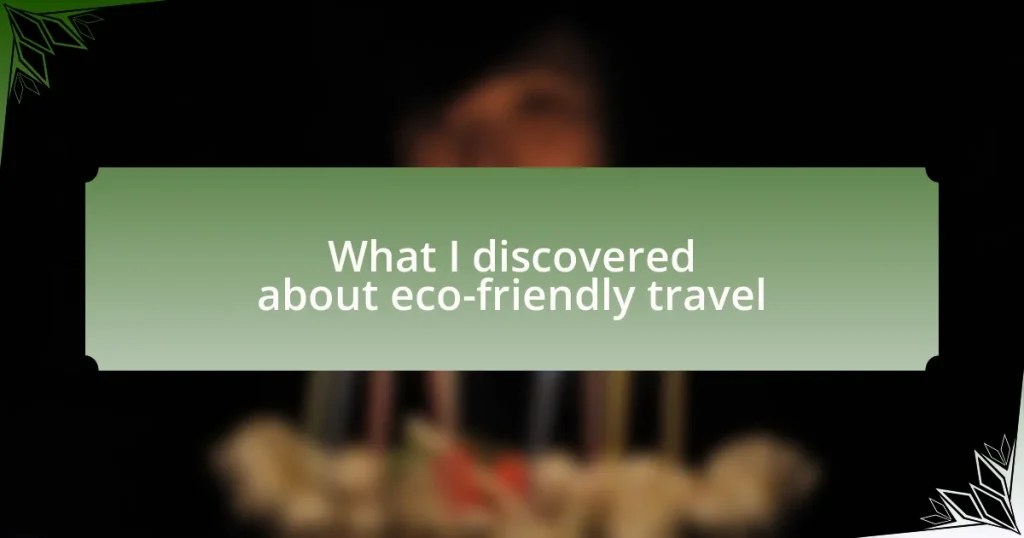Key takeaways:
- Eco-friendly travel focuses on minimizing environmental impact and supporting local communities through sustainable practices.
- Engaging in eco-friendly practices fosters connections with local cultures and enhances personal well-being.
- Travel choices, such as transportation methods and accommodations, significantly affect local economies and ecosystems.
- Experiences in nature and interactions with local communities can deepen appreciation for biodiversity and inspire stewardship.
Author: Evelyn Carter
Bio: Evelyn Carter is an award-winning author known for her gripping psychological thrillers and captivating contemporary fiction. With a background in psychology, she skillfully weaves intricate character studies and suspenseful plots, engaging readers from the first page to the last. Her debut novel, “Shadows of the Mind,” was praised for its sharp insights and unexpected twists, earning her a place among the best new voices in literature. When she’s not writing, Evelyn enjoys exploring the great outdoors and volunteering at her local animal shelter. She lives in Portland, Oregon, with her two spirited rescue dogs.
What is eco-friendly travel
Eco-friendly travel revolves around making choices that minimize our environmental impact while exploring new places. I remember my first eco-friendly trip when I opted for public transport instead of renting a car. The experience of mingling with locals gave me a sense of connection to the destination that I never felt before.
When we think about eco-friendly travel, it goes beyond just reducing carbon footprints. It’s about embracing sustainable tourism practices that support local communities and preserve natural habitats. Have you ever considered how your travel decisions can contribute not only to a healthier planet but also to a thriving economy in the places you visit?
Moreover, eco-friendly travel encourages a mindset shift—seeing the world through a lens of responsibility and respect. On my last trip, I chose to stay at a hotel that emphasized sustainable practices, like using organic products and conserving water. It made me realize that every small action contributes to a larger purpose. How about considering what kind of traveler you want to be and how your adventures can align with an eco-conscious lifestyle?
Importance of eco-friendly travel
The importance of eco-friendly travel cannot be overstated, especially in a world grappling with climate change. When I traveled to a national park that prioritized conservation, I felt an overwhelming sense of gratitude for the natural beauty around me. It was a humbling reminder that our choices today affect the treasures we leave for future generations.
Engaging in eco-friendly travel practices helps to protect wildlife and preserve delicate ecosystems. I vividly remember hiking through a forest where I noticed signs urging visitors to stick to paths to prevent damaging native plants. It struck me how simple actions, like respecting these guidelines, can lead to significant positive outcomes.
By choosing sustainable options, we can foster a sense of community and support local businesses. On one of my trips, I made a point to dine at local eateries rather than chain restaurants, and the connections I formed with the owners and their stories enhanced my experience immeasurably. Isn’t it fascinating how a meal can turn into a cultural exchange? That’s the beauty of eco-friendly travel; it’s not just about what you see, but about the relationships you build along the way.
Benefits of eco-friendly travel
Opting for eco-friendly travel showcases a commitment to sustainability that can inspire others. I recall a trip to a coastal town where our group participated in a beach cleanup. The camaraderie we shared while picking up debris was infectious, and it made me realize how collective efforts can amplify our impact. Have you ever felt that sense of unity when working toward a common goal? It’s a powerful reminder that our choices ripple outwards, encouraging others to adopt similar practices.
Beyond environmental benefits, eco-friendly travel significantly enhances our personal well-being. I once took a yoga retreat nestled in nature, where we practiced mindfulness surrounded by breathtaking landscapes. The tranquility of that space allowed me to reconnect with myself, fostering both mental peace and physical rejuvenation. Can travel get any better than when it elevates not just the earth but your own spirit?
Moreover, sustainable travel often leads to more enriching and authentic experiences. During a bicycle tour in a small village, I met artisans who shared their craft with us firsthand. Instead of a traditional sightseeing experience, I left with new skills and a deeper understanding of their culture. Isn’t that what travel is all about—connecting with the world in a meaningful way? Each of these moments reinforced the idea that eco-friendly travel is not just beneficial for the planet; it’s also transformative for us as individuals.
How to plan eco-friendly trips
When planning eco-friendly trips, the first step I take is to choose destinations that prioritize sustainability. For instance, I recently visited a small eco-resort that sourced its energy from solar panels and used local produce for its meals. This experience was not only refreshing but made me feel like I was supporting a community that values the environment as much as I do. Have you ever wondered how your travel choices impact local economies and ecosystems?
Transportation plays a critical role in sustainable travel. I often opt for trains or buses instead of flights, relishing the scenic views as I slowly make my way to my destination. One memorable journey was a scenic train ride through the mountains, where the serenity of the surroundings was complemented by my eco-conscious choice. Have you considered how the mode of travel can enhance the experience itself while being kinder to our planet?
Lastly, engaging with local communities is crucial when planning eco-friendly trips. I make a point to seek out eco-tours led by residents, which often includes learning traditional crafts or cooking local dishes. When I participated in a cooking class with a local chef, I not only savored delicious meals but also learned about the importance of farm-to-table practices. This kind of interaction fosters genuine connections and deepens our appreciation for diverse cultures. What better way to travel than by immersing yourself in a place and leaving it better than you found it?
Eco-friendly travel destinations
When I think about eco-friendly travel destinations, Costa Rica immediately comes to mind. This lush paradise is renowned for its commitment to conservation, with over 25% of its land designated as protected areas. I felt a wave of tranquility as I explored its rainforests, knowing that my presence contributed to the preservation of such biodiversity. Have you ever felt that palpable sense of harmony in nature?
Another fantastic option I discovered is the quaint town of Sedona, Arizona. The stunning red rock formations not only captivated my eyes but also served as a reminder of the importance of responsible tourism. While hiking, I often reflected on how the local initiatives aimed at maintaining the environment truly make a difference. Have you ever experienced that unique connection with a landscape that inspires you to help protect it?
Lastly, I can’t forget my experience in the Canadian province of British Columbia. Here, I stayed at a lodge powered entirely by renewable energy, and I was amazed by how they integrated eco-friendly practices into every aspect of the visit. While kayaking in pristine waters surrounded by mountains, I was poignantly aware of our responsibilities as travelers. How does being in such untouched beauty change the way you view the world?
Personal experiences with eco-friendly travel
During my last eco-friendly getaway to a biodynamic vineyard in New Zealand, I truly grasped the essence of sustainable travel. Sipping on a glass of organic wine while enjoying a farm-to-table meal, I felt the connection between the land and the food more vividly than ever. Have you ever tasted something and realized its origins can narrate a story of care and stewardship?
Another memorable experience was visiting an eco-lodge in the Amazon rainforest. As I spent my nights falling asleep to the symphony of jungle sounds, I understood the importance of protecting such an extraordinary ecosystem. It was incredibly humbling to be part of a project that supports local communities and wildlife. Have you ever been in a place where the vibrant life around you made you reflect on your own impact?
On a recent hiking trip through the Scottish Highlands, I was struck by the dedication of the trail organizers to maintain the landscape. The beauty of the untouched nature filled me with awe and gratitude, yet it also made me think about our collective responsibility to preserve these wonders. Have you walked through a place that inspired you to advocate for its preservation long after you’ve left?
Tips for sustainable travel choices
Choosing sustainable travel options can really enhance your journey while caring for the planet. For example, on my recent adventure to a national park, I made it a point to walk and bike rather than drive. This not only allowed me to appreciate the scenery fully but also kept my carbon footprint minimal. Have you ever felt the difference when you take your time to explore at a slower pace?
Another tip I discovered is to prioritize local businesses when planning trips. During a visit to a small coastal town, I chose to stay at a locally owned bed and breakfast instead of a chain hotel. The hospitality was warm and personal, and I got to enjoy homemade breakfast featuring local ingredients. It made me wonder how often we miss out on authentic experiences by opting for mainstream choices.
Lastly, packing light can make a significant impact. On my last flight, I aimed to travel with just one carry-on bag. This not only saved me from extra fees but also reduced the overall weight of the plane, which contributes to lower fuel consumption. Have you ever realized that less truly can be more, especially when it comes to travel?




